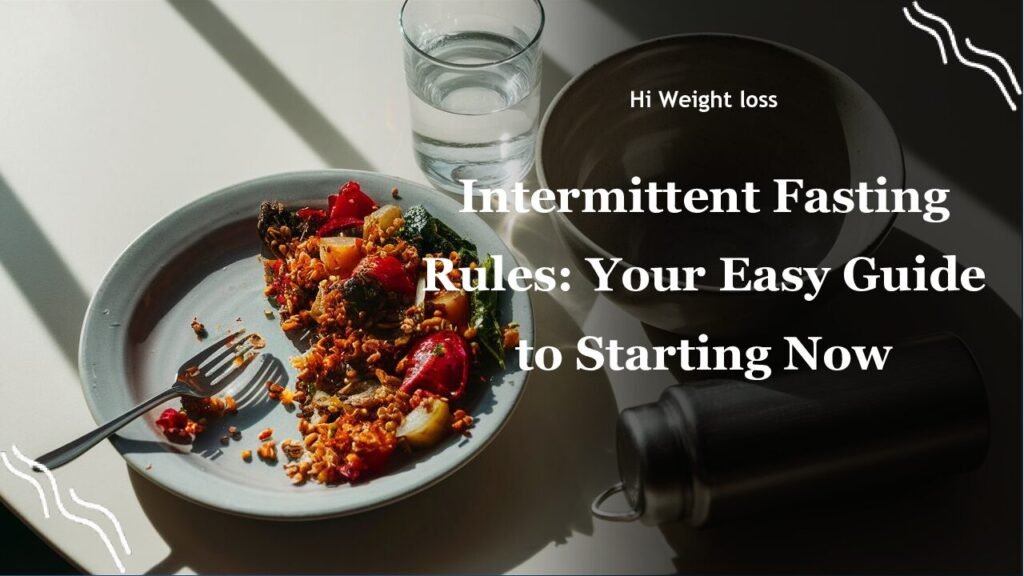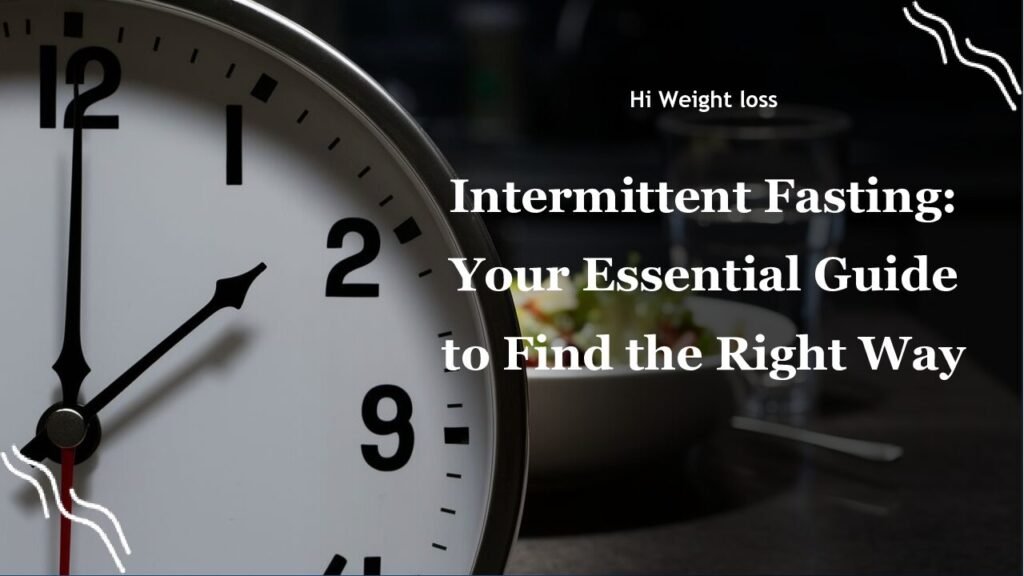Struggling to lose that stubborn belly fat? It’s a common frustration, and you might be wondering if intermittent fasting could be the solution. Imagine finally feeling comfortable in your clothes and having the energy to do the things you love, all by making changes to when you eat instead of what you eat. This article will delve into the science behind intermittent fasting and its effectiveness in burning belly fat, offering insights and practical advice along the way.
Does Intermittent Fasting Burn Belly Fat?
Let’s get straight to the point: _yes_, intermittent fasting can indeed help you burn belly fat. But how does it work? I remember when I first looked into intermittent fasting, I was skeptical. Like many, I thought skipping meals was unhealthy, but the research surprised me, and now it’s part of my weekly routine. According to the evidence from various studies, intermittent fasting proves effective in reducing both visceral and subcutaneous fat, especially for individuals who are overweight or obese.
Understanding Visceral and Subcutaneous Fat
Before we go any further, it’s important to understand the two types of belly fat. Visceral fat is the fat that surrounds your organs, while subcutaneous fat is the fat just under your skin. Both types are targeted by intermittent fasting. Think of visceral fat as the hidden danger, linked to various health issues. Subcutaneous fat, while visible, is often easier to tackle. Studies show intermittent fasting may lead to a reduction in visceral fat, which is particularly beneficial. For example, a study published in _Nature Medicine_ revealed that those practicing intermittent fasting experienced more weight loss and a drop in subcutaneous fat in the abdominal area.
One of my friends, Sarah, was struggling with her weight for years. She mentioned feeling sluggish all the time. When she started intermittent fasting, she noticed that her clothes felt looser. It wasn’t just about the number on the scale for her, but also about how she felt. She said it was like her body finally started working with her.

How Does Intermittent Fasting Reduce Belly Fat?
The magic of intermittent fasting lies in creating a calorie deficit. When you fast, your body is forced to tap into its fat stores for energy. This process encourages _fat burning_ and promotes weight loss. Have you ever noticed how your energy levels dip in the hours after eating a big meal? When you fast, your body enters a state called ketosis, where it starts using fatty acids instead of sugar as its primary fuel source. This not only aids in _belly fat loss_ but also improves your body’s glucose metabolism.
The Science Behind Fat Metabolism
Let’s dive a bit deeper into how intermittent fasting primes your body for fat metabolism. In a fasted state, your body’s insulin levels drop. Lower insulin levels signal your body to break down stored fat to use as fuel. This is how intermittent fasting can really help you _reduce belly fat_. This improved insulin sensitivity can have broader benefits for your overall health. Research indicates that intermittent fasting can enhance the body’s capacity to oxidize fat, further aiding in the fat-burning process.
Different Types of Intermittent Fasting
There are several types of intermittent fasting. The most popular is the 16/8 method, where you fast for 16 hours and eat during an 8-hour window. This is what I personally use, and it fits my lifestyle pretty well. Other variations include the 5:2 diet, where you eat normally for five days and restrict calories for two, or alternate day fasting. The best approach is the one that aligns best with your lifestyle and preferences. Which type might suit _you_ best?
Is Intermittent Fasting Superior to Calorie Restriction?
Now, a common question is: is intermittent fasting more effective than simply restricting calories? The answer is, well, it’s complicated. Some studies suggest it may not be more effective. Other research, however, shows that intermittent fasting may lead to slightly more visceral fat loss. The effectiveness can vary based on individual factors such as hormonal responses and overall lifestyle changes. It’s worth noting, though, that Harvard’s School of Public Health emphasizes that more studies are needed to fully understand the impact of intermittent fasting.
I met a lady at the gym a while back, she confessed to me that she had been cutting calories for years without much success in losing her belly fat. After switching to intermittent fasting, she saw noticeable differences in a couple of months. She described her transformation as more focused, and her weight seemed to drop more naturally. Each person’s journey is different, and what works for one may not work for another.
Personal Experiences and Insights
From personal experience, I can say intermittent fasting is not just about losing weight, it is about gaining a new understanding of my relationship with food. It helps me feel more in tune with my body’s hunger cues. Now I tend to eat more mindfully when I do eat, which I found was a bonus. It’s not a magic fix; it requires consistency, and there are days when it’s harder than others, but the results and the improved health make it worth it. What if _you_ start seeing these changes too?
Making Intermittent Fasting Work for You
Intermittent fasting, like any lifestyle change, isn’t a one-size-fits-all solution. Before you start, consider your current health and consult a professional if needed. If you decide to try it, start gradually. Begin with a 12-hour fasting period and gradually increase it to 16 hours. Listen to your body and pay attention to how you feel during your fasting periods. Consistency is key. Don’t give up after a few days. It may take time before you see results. Is this a change that _you_ might want to consider?
Potential Challenges and Considerations
Intermittent fasting isn’t without its challenges. Some individuals might experience fatigue, irritability, or difficulty concentrating, especially when starting out. It’s crucial to stay hydrated and eat a balanced diet during your eating windows. It’s also essential to be realistic about your goals and expectations. And remember, it’s not about deprivation, but rather a structured way of eating. Are you willing to face these challenges?
Summary of Key Findings
Here is a brief summary of the key points we’ve covered:
| Key Point | Description |
|---|---|
| Effectiveness | Intermittent fasting can reduce both visceral and subcutaneous belly fat. |
| Mechanism | It creates a calorie deficit and promotes fat metabolism, shifting your body to using fat as fuel. |
| Types | Various approaches like 16/8, 5:2, and alternate day fasting exist. |
| Individual Differences | Results can vary based on hormonal responses and lifestyle. |
Conclusion
So, does intermittent fasting burn belly fat? The evidence, combined with real-life experiences, strongly suggests it can. It’s not a magical cure, but a tool that, when used correctly, can help you reach your weight loss goals. Remember my friend Sarah? She transformed her health with consistent intermittent fasting, not only losing weight but also feeling more energized. Similarly, my own journey with intermittent fasting has taught me about mindful eating and how to listen to my body. The key to success lies in consistency, patience, and a holistic approach to health. Start by considering your current health, gradually increasing your fasting time, and always consult with healthcare professionals when needed. Why not see if intermittent fasting works for _you_? Share this article with your friends or try out the advice given here, and let’s take the next step towards a healthier version of ourselves!
FAQ
Is intermittent fasting safe for everyone?
Intermittent fasting is generally safe for most healthy adults. However, it might not be suitable for pregnant women, individuals with eating disorders, and people with certain medical conditions. It’s best to consult with a healthcare professional before starting intermittent fasting.
How long does it take to see results with intermittent fasting?
The time it takes to see results varies among individuals. Some people may notice changes within a few weeks, while for others, it may take a few months. Consistency is key, and it’s important to combine intermittent fasting with a healthy diet and regular exercise for optimal results.
Can I exercise while fasting?
Yes, you can exercise while fasting. Low-intensity workouts are generally recommended during fasting periods. However, it’s essential to listen to your body and adjust your exercise routine as needed. If you feel overly tired or weak, avoid strenuous exercise.
Can intermittent fasting lead to muscle loss?
If you are doing intense exercise, Intermittent fasting can potentially lead to muscle loss if not done correctly, particularly if your protein intake is not adequate during your eating windows. Ensure you are consuming sufficient protein and consider incorporating resistance training to preserve muscle mass.
Do I need to count calories while on intermittent fasting?
While intermittent fasting naturally promotes calorie reduction, paying attention to what you eat is still important. Focus on consuming nutrient-dense meals during your eating windows. You don’t necessarily have to count calories, but be mindful of your portion sizes and food choices.



